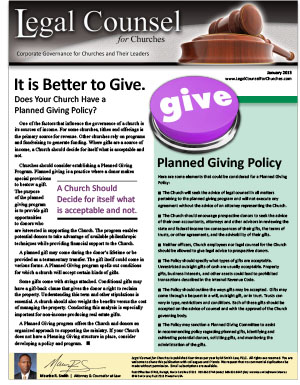Does Your Church Have a Planned Giving Policy?
One of the factors that influence the governance of a church is its sources of income. For some churches, tithes and offerings is the primary source for revenue. Other churches rely on programs and fundraising to generate funding. Where gifts are a source of income, a Church should decide for itself what is acceptable and not.
Churches should consider establishing a Planned Giving Program. Planned giving is a practice where a donor makes special provisions to bestow a gift.
The purpose of the planned giving program is to provide gift opportunities to donors who are interested in supporting the Church. The program enables potential donors to take advantage of available philanthropic techniques while providing financial support to the Church.
A planned gift may come during the donor’s lifetime or be provided as a testamentary transfer. The gift itself could come in various forms. A Planned Giving program spells out conditions for which a church will accept certain kinds of gifts.
Some gifts come with strings attached. Conditional gifts may have a gift-back clause that gives the donor a right to reclaim the property. Understanding this term and other stipulations is essential. A church should also weight the benefits versus the cost of managing the property. Conducting this analysis is especially important for non-income producing real estate gifts.
A Planned Giving program offers the Church and donors an organized approach to supporting the ministry. If your Church does not have a Planning Giving structure in place, consider developing a policy and program.
Planned Giving Policy
Here are some elements that could be considered for a Planned Giving Policy:
- The Church will seek the advice of legal counsel in all matters pertaining to the planned giving program and will not execute any agreement without the advice of an attorney representing the Church.
- The Church should encourage prospective donors to seek the advice of their own accountants, attorneys and other advisors in reviewing the state and federal income tax consequences of their gifts, the terms of trusts, or other agreements, and the advisability of their gifts.
- Neither officers, Church employees nor legal counsel for the Church should be allowed to give legal advice to prospective donors.
- The Policy should specify what types of gifts are acceptable. Unrestricted outright gifts of cash are usually acceptable. Property gifts, business interests, and other assets could lead to prohibited transactions described in the Internal Revenue Code.
- The Policy should outline the ways gifts may be accepted. Gifts may come through a bequest in a will, outright gift, or in trust. Trusts can vary in type, restrictions and conditions. Each of these gifts should be accepted on the advice of counsel and with the approval of the Church governing body.
- The Policy may sanction a Planned Giving Committee to assist in recommending policy regarding planned gifts, identifying and cultivating potential donors, soliciting gifts, and monitoring the administration of the gifts.

